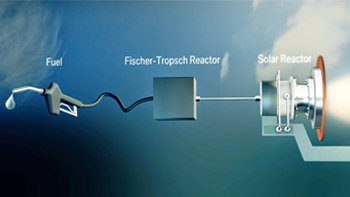The world’s first “solar” jet fuel has successfully been produced by researchers as part of an EU-funded project.
Called SOLAR-JET, it aims to demonstrate a carbon-neutral path for producing aviation fuel in an economically viable way. Researchers have shown the entire production chain for renewable kerosene using simulated sunlight as a high-temperature energy source.
Concentrated light – or simulating sunlight – was initially used to convert carbon dioxide and water to synthesis gas (syngas) in a high-temperature solar reactor. The syngas (a mixture of hydrogen and carbon monoxide) was then converted into kerosene by using the so-called “Fischer-Tropsch” process.

Although still at the experimental stage, the process has the potential to produce any other type of fuel for transport applications such as diesel, gasoline or pure hydrogen in a more sustainable way using sunlight, CO2 and water, the European Commission said.
Máire Geoghegan-Quinn, European Commissioner for Research, Innovation and Science said: “This technology means we might one day produce cleaner and plentiful fuel for planes, cars and other forms of transport. This could greatly increase energy security and turn one of the main greenhouse gases responsible for global warming into a useful resource.”
The four-year project was launched in June 2011 and is receiving €2.2 million (£1.8m) of EU funding.





